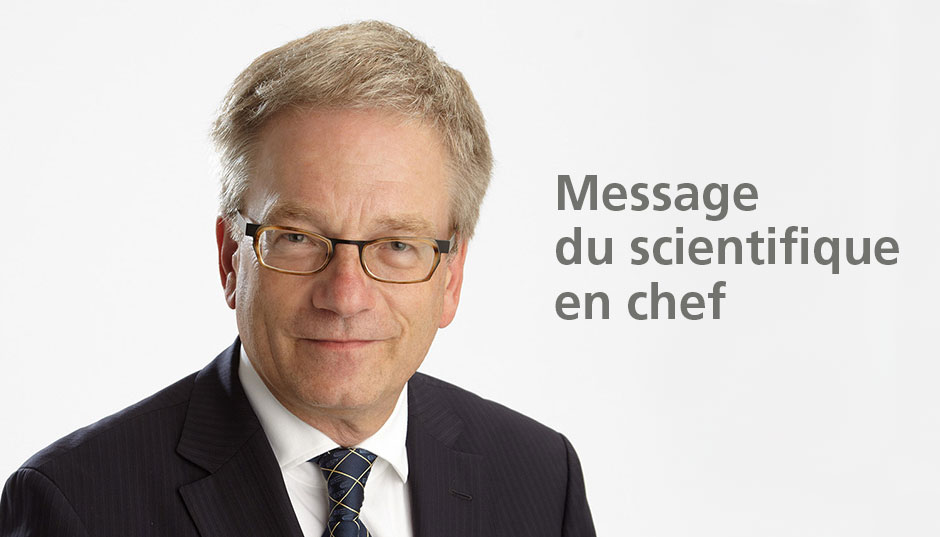I would like to wish you all health and success in 2016. In the next year, we will continue to face many challenges. Still, we are confident that new opportunities to support research and innovation will arise in Québec and Canada. In many respects, the circumstances in recent years have been difficult. Still, we remain hopeful, and 2016 could prove to be a good indicator and barometer.
Federal and provincial governments
The governments of Québec and Canada are sending out very clear signals. At the federal level, I met with Minister of Science Kirsty Duncan, and executives from the three granting councils have been invited (SSHRC) or will be invited (NSERC, CIHR) to speak to members at the meetings of the boards of directors of the three Fonds de recherche du Québec (FRQ). The FRQ also met with officials from the Canada Foundation for Innovation and CEO Gilles Patry. Moreover, Marc Lepage, the former CEO of Génome Québec, was appointed CEO of Genome Canada, and his nomination should help facilitate the links between the two organizations. One of the key objectives of these meetings was to ensure better coordination between provincial and federal research and innovation strategies to make Québec researchers and research students as competitive as possible on the national and international scenes.
At the provincial level, Premier Philippe Couillard has stated several times that innovation is among the government’s key priorities in 2016. Needless to say, research and innovation go hand in hand. In fact, a series of joint programs led by the FRQ and government departments are about to be finalized, including collaborations on the cultural digital strategy and the maritime strategy, sustainable development, radicalisation and primary care centres. In addition, as I announced in my last message, the 2014–2017 strategic plans of the three Fonds are now available online for consultation, comments and suggestions.
This year, we will especially focus on developing intersectoral research programs driven by three of the major social changes that are taking place in Québec and which were set out in the strategic plans of the FRQ: demographic changes, climate change and sustainable development, and entrepreneurship and creativity. Also, the intersectoral student committee is expected to submit proposals to enhance student training and the scholarships offered by the FRQ to better account for current and new realities.
Communications and knowledge mobilization
Last year, I pointed out some of my concerns when groups and segments of the population call science and research into question. The FRQ therefore organized brainstorming sessions on the topic and met with several stakeholders, including journalists, science communicators, elected officials and citizens. These actions culminated in a forum held on December 4 at the Grande Bibliothèque that brought together 150 participants (researchers, students, science communicators, journalists and citizens). We are currently working to finalize the report on the discussions and the proposals submitted by participants and intend to carry out certain initiatives this year (e.g. better recognition by all of our programs of the participation of researchers and research students in public dissemination, transfer and knowledge mobilization activities). Close collaboration with our academic partners is critical to ensure the impacts of the measures.
Also in 2015, we organized two scientific information activities on the work and results presented by our researchers for elected officials at the National Assembly of Québec. The politicians enjoyed the events and took the initiative to create a working group in association with the FRQ to stay informed on current issues in research and innovation (e.g. social impacts of CRISPR genome editing). Additional activities will be held in 2016. Also in an effort to support dissemination, the FRQ joined forces with Palais des congrès de Montréal to launch a scientific conferences program (read the announcement).
International outreach
At the international level, the FRQ’s scientific directors and I took part in a number of government missions, most recently as part of COP21 in Paris. The main objective was to provide visibility for Québec’s climate change researchers, specifically as part of the development of Future Earth in Montréal. I also attended the most recent meeting of Future Earth’s governing committee, which led to the signing of a memorandum of understanding between Future Earth’s board of directors, director Mr. Paul Shrivastava (Concordia University) and hubs, including Montréal. A series of research programs funded by Future Earth and the Belmont Forum are expected to be launched this year. I certainly hope that our researchers will contribute to them. Stay tuned!
During COP21, I participated in an innovation summit organized by the European Union and had the opportunity to meet with Carlos Moedas, the European commissioner of research, science and innovation, and several officers from European organizations. The aim was to better position Québec within the European programs and act as an observer during the EU’s next research and innovation strategic planning session (post-2020 EU).
In November, we hosted Sir Peter Gluckman, New Zealand’s Chief Science Advisor. His visit was very productive and included meetings in Ottawa and Montréal. Together, we discussed the upcoming assembly of chief scientific advisors, which will be held in Brussels in September. In fact, Peter Gluckman is the chairman of the organizing committee of which I am a member. The meeting in Brussels should enable us to compare our approaches with those adopted by other advisors around the world and explore the possibility of developing multi-language science policy training programs.
FRQ appointments
The FRQ recently made several administrative changes. First, Louise Poissant took office in October as the scientific director of the Fonds Société et culture. Karine Assal was appointed director of administration of the FRQ in replacement of Pierre Prémont, who retired but remains with the FRQ as the secretary of the three boards of directors. David Côté was appointed director of finance, and Elisabeth Garin was named director of planning and performance following France Busque’s well-deserved retirement. The new team is brimming with enthusiasm and seeks to be more attuned to the needs of Québec’s researcher and research student community. Should you have any comments or suggestions, please do not hesitate to contact us.
Rémi Quirion, O.C., C.Q., PhD, FRSC
> See more messages to the community





